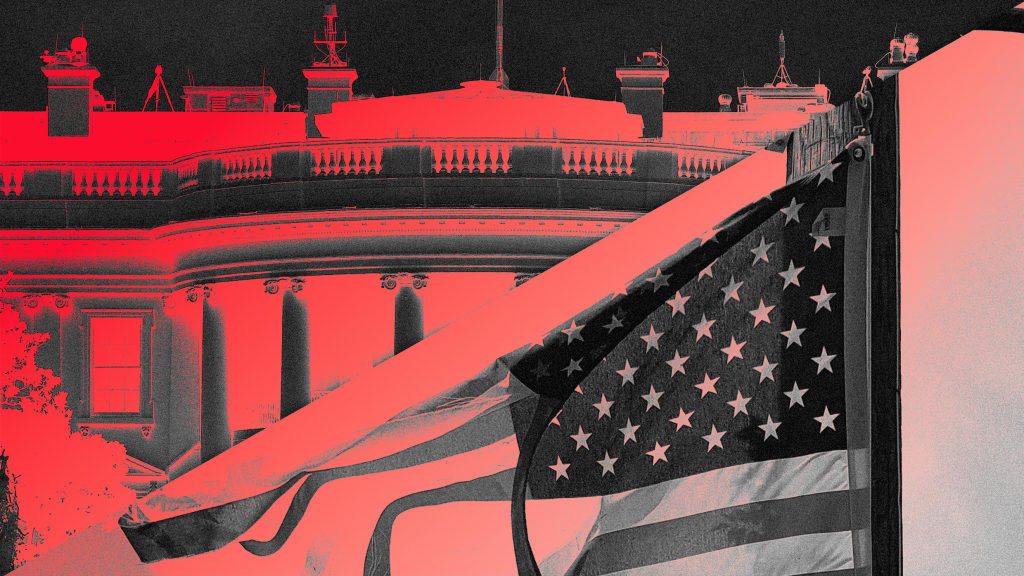Earlier this month, Paul Dans announced that he was stepping away from the Heritage Foundation. At the conservative think tank, Dans had been tasked with directing Project 2025, a multi-pronged initiative to support the next Republican president. The idea was to build a database of conservative players who could serve in the future administration—a “conservative LinkedIn,” as Dans put it—and compile a sweeping set of policy proposals.
In recent months, that policy plan has become fodder for Vice President Kamala Harris and other Democrats, who have drawn attention to its controversial recommendations on the campaign trail and lobbed attacks at Donald Trump. Meanwhile, Trump has repeatedly tried to distance himself from Project 2025 and deny any involvement. “It’s a group of very, very conservative people,” he told Fox News in July. “And they wrote a document that many of the points are fine. Many of the points are absolutely ridiculous.”
But a number of people responsible for drafting the project’s policy proposals—including Dans—previously served in the Trump administration, and Trump’s running mate J.D. Vance has his own connections to Project 2025. (Vance wrote the foreword for an upcoming book by the Heritage Foundation president Kevin Roberts.) According to a ProPublica report, the architects of Project 2025 wanted to ensure there was a pipeline of Trump loyalists who could step into roles in the administration—along with a blueprint for how they could reshape the executive branch.
The Heritage Foundation has said that with Dans’s departure, the policy work for Project 2025 has come to an end. Still, the plan offers insight into how a second Trump administration might approach crucial issues. Project 2025 outlines a slew of extreme policy recommendations, from dismantling the Department of Education to replacing experienced civil servants with political appointees. But the policy plan also repeatedly returns to the topic of diversity, equity, and inclusion across its nearly 900 pages, taking aim at DEI initiatives in the executive branch and federal agencies.
The foreword clearly signals the project’s intentions, and in a moment when DEI work at every level—whether in the government or private sector—has been under near-constant attack. “The next conservative President must make the institutions of American civil society hard targets for woke culture warriors,” the authors write. “This starts with deleting the terms sexual orientation and gender identity (“SOGI”), diversity, equity, and inclusion (“DEI”), gender, gender equality, gender equity, gender awareness, gender-sensitive, abortion, reproductive health, reproductive rights, and any other term used to deprive Americans of their First Amendment rights out of every federal rule, agency regulation, contract, grant, regulation, and piece of legislation that exists.”
Conservative backlash to DEI
The policy blueprint is a snapshot of nearly every talking point conservatives have trotted out in recent years, painting DEI as a dangerous influence that needs to be stamped out. There are countless references to the “woke” agenda pushed by the Biden administration and critical race theory, which has been a target of Republican politicians since 2020 and the driving force behind a flurry of state legislation that has sought to regulate how schools and other public institutions discuss issues of racial equity.
In the section on the Department of Education, the authors call for the next president to issue an executive order that requires “an accounting of how federal programs/grants spread DEI/CRT/gender ideology.” While the topic is given outsize attention in the context of education and schools, anti-DEI rhetoric is embedded throughout the pages of Project 2025’s policy plan. A recommendation intended for the secretary of the Department of Housing and Urban Development urges them to “initiate a HUD task force consisting of politically appointed personnel to identify and reverse all actions taken by the Biden Administration to advance progressive ideology.”
The authors encourage the Department of Energy to be wary of programs that attempt to smuggle “social agendas” into energy policy. “Programs that sound innocuous, such as “energy justice,” Justice40, and DEI, can be transformed to promote politicized agendas,” they write.
The authors characterize workplace DEI efforts as a violation of anti-discrimination laws, directing the Department of Justice to task the Civil Rights Division with “a return to lawfulness” and investigating public and private employers. “Even though numerous federal laws prohibit discrimination based on notable immutable characteristics such as race and sex, the Biden Administration—through the DOJ’s Civil Rights Division and other federal entities—has enshrined affirmative discrimination in all aspects of its operations under the guise of ‘equity,’” they wrote.
Reversing DEI policies and precedent
In 2021, Biden signed an executive order that required federal agencies to invest in DEI trainings and appoint leaders who would spearhead DEI initiatives. Many of the recommendations in this document focus on undoing those workplace DEI initiatives, which have become commonplace across corporate America and were a priority for the Biden administration in the aftermath of George Floyd’s murder.
In the section devoted to the U.S. Agency for International Development (USAID), the authors suggest that the role of chief diversity officer should be eliminated, along with an agency-wide scorecard that tracks compliance with DEI initiatives. When the authors address the Department of Treasury, they propose not only scrapping all of the agency’s efforts to promote equity, but also holding its staff accountable for participating in those initiatives. “Treat the participation in any critical race theory or DEI initiative, without objecting on constitutional or moral grounds, as per se grounds for termination of employment,” they wrote, in addition to advocating for making public all DEI-related communications.
The authors even take issue with alleged efforts at the National Institutes of Health to expand the representation of female speakers at science conferences. “Under Francis Collins, NIH became so focused on the #MeToo movement that it refused to sponsor scientific conferences unless there were a certain number of women panelists, which violates federal civil rights law against sex discrimination,” they wrote. “This quota practice should be ended, and the NIH Office of Equity, Diversity, and Inclusion, which pushes such unlawful actions, should be abolished.”
But Project 2025’s policy blueprint goes even further at times, proposing ideas that would reverse decades of precedent in the realm of labor policy. One such proposal is to do away with EEO-1 reports, which requires private sector employers with at least 100 employees—and federal contractors with over 50 employees—to disclose the demographics of their workforce to the Equal Employment Opportunity Commission on an annual basis. The authors also argue that Title VII—the section of the 1964 Civil Rights Act which protects against employment discrimination on the basis of race, color, religion, sex, and national origin—should be amended to bar the EEOC from requesting EEO-1 reports or “any other racial classifications in employment for both private and public workplaces.”
The EEOC has collected this kind of data since 1966, enabling the agency to track the rise in labor force participation for women and underrepresented groups and capture historical trends during a period of rapid change in the workforce. More recently, this data has helped inform corporate diversity reports. (Even so, employers have fought to keep EEO-1 reports out of the public eye, though Reveal obtained demographic data for federal contractors in 2023 following a lengthy legal battle.) Project 2025’s recommendation to upend this precedent aligns with its vision to scrub DEI from the federal government, but it could also empower private employers to divest from those initiatives—at a time when corporate DEI work is already losing ground.
If Trump wins the election, it’s unlikely that all of these proposals would actually be adopted by the new administration; Trump himself has described some of the recommendations in Project 2025 as “absolutely ridiculous and abysmal.” At the same time, he has long been vocal in his disdain for DEI and has a record of using the power of the presidency to undermine diversity initiatives. During a rally in New Hampshire in January, Trump said that if reelected, he would “terminate every diversity, equity and inclusion program across the entire federal government”—which sounds a lot like what the authors of Project 2025 have in mind.
Apply to the Most Innovative Companies Awards and be recognized as an organization driving the world forward through innovation. Early-rate deadline: Friday, August 23.






)
